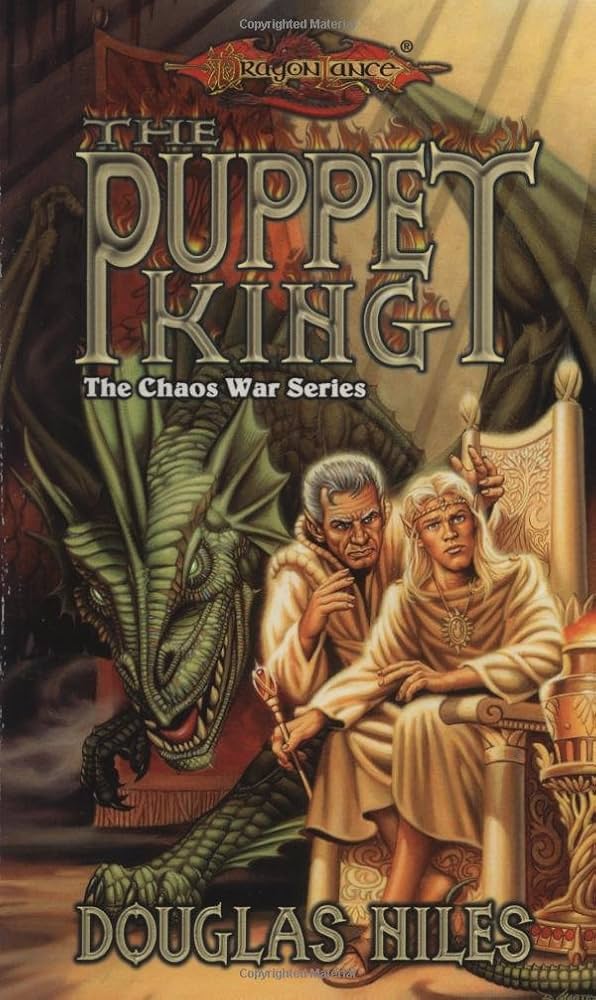The Puppet King

Table of Contents
ToggleOverview
The Puppet King is set during the Chaos War era and focuses on King Lewin of Qualinesti, a reluctant and tragic ruler caught between duty, manipulation, and destiny. Unlike many Dragonlance books that follow bands of heroes or sweeping quests, this story unfolds inside palaces and war councils, where words and politics are often deadlier than swords.
As the gods withdraw and Chaos begins to shake Krynn’s foundations, Lewin must confront internal rebellion, elven pride, betrayal, and his own deep insecurities. The title is no metaphor—Lewin is a king in name, but others pull the strings.
This is Dragonlance as Shakespearean tragedy: layered, nuanced, and ultimately heartbreaking.
Main Character: King Lewin Roadstriker
- A young, untested human noble unexpectedly elevated to King of Qualinesti, an elven kingdom with a deep disdain for outsiders.
- Kind-hearted and idealistic but deeply insecure, especially about his place in an elven court.
- His story is one of isolation, manipulation, and eventual self-realization, as he struggles to be more than a pawn.
Supporting Characters
- Porthios Kanan – The proud and traditionalist elven leader (brother of Laurana) who resents Lewin’s appointment and represents the elven nobility’s distrust of humans.
- Elansa – Lewin’s elven wife, whose love is sincere but strained by politics and prejudice.
- General Chofak – An aggressive and capable military leader pushing for hardline action against rebellion and human threats.
- Lady Rilla – A political manipulator in court who plays her own dangerous games with the throne.
Setting
- The novel is largely set in Qualinesti, the secretive and once-glorious elven forest kingdom, now riddled with factionalism and unrest.
- The world around is descending into chaos as the gods retreat and Chaos begins to rise, but most of the conflict here is personal and political.
- A growing rebellion of disenfranchised humans and elves adds pressure, threatening to topple the already-shaky regime.
Plot Summary
An Outsider King
Lewin, a human raised among elves, has been named King of Qualinesti under controversial circumstances. He inherited the throne as a political compromise—but few accept him. Most of the elven nobility see him as a puppet, a weakling, or a traitor.
Though Lewin loves his people and wants peace, he is constantly undermined by those around him. Porthios, in particular, resents him bitterly and works to reassert elven dominance over the court.
A Kingdom on the Brink
The kingdom faces unrest:
- Human settlers in borderlands grow more defiant.
- Elven nobles want war to “preserve purity.”
- The common folk begin to lose faith in both traditions and the crown.
Amid this, Lewin desperately tries to unite the court, protect the realm, and be his own man—but finds himself boxed in by others’ agendas.
Love and Loss
Lewin’s relationship with Elansa is one of the few genuine connections he has. Their marriage was politically arranged but slowly becomes emotionally real—only to be tested by tragedy and betrayal.
As rebellion breaks out, and Porthios makes his move, Lewin is forced to choose between:
- Becoming the figurehead others expect him to be, or
- Making a stand—even if it costs him everything.
The Puppet No More
In the book’s climax, Lewin refuses to be ruled by fear or legacy. He takes decisive action to quell the rebellion, but it comes too late to save his reign.
The story ends on a powerful, tragic note: Lewin may have finally learned how to lead—but he was never truly allowed to rule. His downfall is both personal and political, a casualty of pride, fear, and the slow death of an old world.
Themes
- Leadership vs. Control – What does it mean to rule? Is it enough to have the title, or must one seize power from those who hold it in the shadows?
- Prejudice and Isolation – Lewin’s human blood is symbolic of broader divisions—race, class, legacy, and fear of change.
- Love in a Broken World – Lewin and Elansa’s relationship is beautiful but doomed, a mirror of the kingdom itself.
- The Cost of Inaction – Good intentions aren’t enough. Lewin’s tragedy is that he hesitates too long, surrounded by those who act without conscience.
- Change vs. Tradition – The novel explores the pain of a society that refuses to evolve, even as the world shifts beneath it.
Tone & Style
- Tragic, tense, and politically layered, with very little magic or high fantasy—this is more courtroom drama and emotional warfare.
- Character-driven, with a focus on inner thoughts, interpersonal relationships, and quiet betrayals.
- Reads like a fantasy version of Hamlet or The Godfather: a man in power who never truly wields it, until it’s too late.
Reception
The Puppet King is often praised for:
- Its unique focus on politics, court intrigue, and slow-burning personal drama
- A sympathetic and deeply human protagonist in Lewin
- Expanding the emotional landscape of the Chaos War, showing how even minor players face immense tragedy
Critics sometimes note:
- The pace is slower and more cerebral than most Dragonlance novels
- Readers expecting high adventure may find the plot too internalized or subdued
But for fans of complex character arcs, tragic leadership, and nuanced worldbuilding, it’s a powerful and underrated story.
Final Thoughts
The Puppet King is a poignant, heartbreaking portrait of a man crushed by legacy and politics, told in a rich, emotionally intelligent voice. It’s not a story of battlefield glory—but of the slow, quiet tragedy of failed dreams and the weight of impossible expectations.
Recommended for:
- Fans of political intrigue, Shakespearean tragedy, and flawed heroes
- Readers curious about elven culture, leadership crises, and Chaos War fallout
- Anyone who appreciates character-driven stories with emotional and historical weight
“He wore the crown—but never owned it. In the end, he learned too late that a true king must risk everything to rule.”
